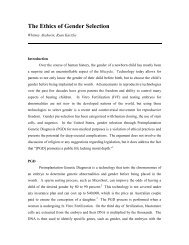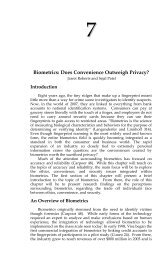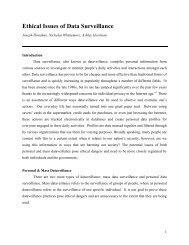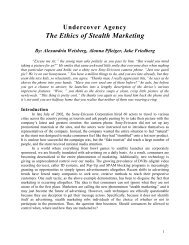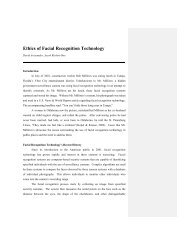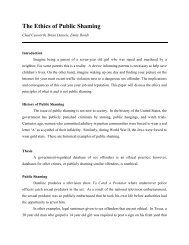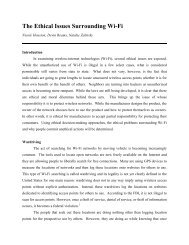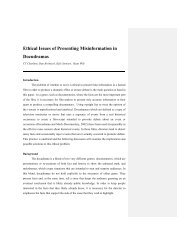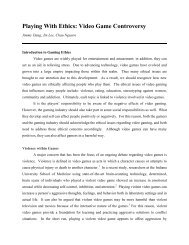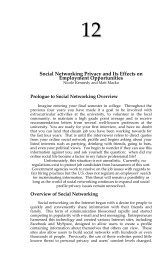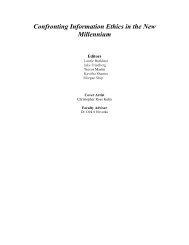Ethics of Stock Option Backdating - Ethicapublishing.com
Ethics of Stock Option Backdating - Ethicapublishing.com
Ethics of Stock Option Backdating - Ethicapublishing.com
Create successful ePaper yourself
Turn your PDF publications into a flip-book with our unique Google optimized e-Paper software.
shareholders, by way <strong>of</strong> financial statements, as to the amount <strong>of</strong> <strong>com</strong>pensation they are<br />
receiving for the services they render. Reducing corporate transparency leads to a loss <strong>of</strong><br />
shareholder confidence, and violates the social and legal contract executives entered into<br />
with the shareholders when they accepted a position at the <strong>com</strong>pany. Misleading and<br />
deceptive information is unethical when there is a contractual obligation to provide<br />
honest and accurate information.<br />
<strong>Backdating</strong> violates the ethics <strong>of</strong> the manager/shareholder contract-based<br />
framework. An implicit agreement is said to exist between individuals and the groups<br />
they belong to. This agreement dictates the rights and responsibilities <strong>of</strong> the individuals<br />
within the group. This framework applies to executives, in that they work at a firm on a<br />
voluntary basis, and this choice is what obligates them to act ethically. In the case <strong>of</strong> most<br />
executives, the agreement is more than an implicit one, since they are explicitly defined<br />
by actual, legal contracts <strong>of</strong> employment as well as by the laws and regulations <strong>of</strong> the<br />
society in which they operate. Some might argue that the social contract theory does not<br />
hold in the case <strong>of</strong> government regulation, in this case taxation, because the agreement is<br />
not entered voluntarily but rather through government force. However, the unethical<br />
behavior is not reliant on the tax evasion property <strong>of</strong> backdating, but on the detriment<br />
caused to the shareholders that the executives work for. <strong>Backdating</strong> directly reduces<br />
returns that the shareholders would have otherwise realized. According to a contract-<br />
based ethical framework, the act <strong>of</strong> backdating and misrepresentation <strong>of</strong> <strong>com</strong>pensation<br />
practices is unethical.<br />
Moral Disengagement<br />
It can be argued that only a few managers at a few firms might take advantage <strong>of</strong><br />
loopholes to increase their <strong>com</strong>pensation. This counterargument is the basis for the belief<br />
that backdating was not a product <strong>of</strong> a widespread breakdown <strong>of</strong> ethics, but in actuality<br />
the wrongdoings <strong>of</strong> a few individuals with each situation being detached from the rest.<br />
However, a recent joint investigation by the Securities and Exchange Commission and<br />
Justice Department has found potentially fraudulent behavior with executive stock option<br />
grants at more than 120 <strong>com</strong>panies. The question is then, how did so many executives, all<br />
at different <strong>com</strong>panies, <strong>com</strong>e to take part in this unethical act? The answer is moral



![Download Entire Book [PDF] - Ethicapublishing.com](https://img.yumpu.com/19531485/1/190x245/download-entire-book-pdf-ethicapublishingcom.jpg?quality=85)
![Download Entire Book [PDF] - Ethicapublishing.com](https://img.yumpu.com/19531484/1/190x245/download-entire-book-pdf-ethicapublishingcom.jpg?quality=85)
